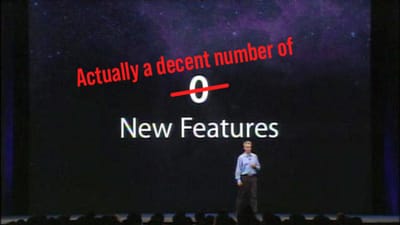The Opposite of "Trust Us, We Know What We're Doing"
Apple gets a lot of criticism for forcing users to change their behaviors to fit Apple's view of the world. The company routinely removes hardware features before the rest of the industry and they create software platforms that tend to give you fewer options, but Apple's entire pitch is that they have taken the time to make the right choices so you don't have to. The "it just works" campaign was born out of an industry that allowed infinite choice and little clarity. "It just works" doesn't mean that every feature works 100% of the time1, it means that you don't have to think about how something gets done, you just do it.
One of the side effects of this is that it sometimes seems Apple thinks they know better than us. Don't worry about why this isn't how you think it should be because Apple knows best. I think there is something to be said for a company taking this stance, but 2016 looks like a year where Apple flipped the expectation and took the feedback they were getting from their users to heart.
Every new watchOS 3 feature is a response to feedback
"This is the version of X that Y should have released in the first place" may be the dumbest thing you can say in tech criticism, but we're hearing a lot of that in regards to what Apple did with the Apple Watch at WWDC. watchOS 3 is all about being faster than ever before (like, a lot effing faster), fixing the side button that no one used, fixing Glances (by killing them and replacing them with The Dock), and making Activity and Workouts a much bigger part of the overall experience.
watchOS 1 was a solid foundation with a lot of problems. Apple didn't know these were problems until they got the product in millions of people's…wrists…and saw how they used it day to day. After 14 months of user feedback to go on, the updates to watchOS show a company who is acutely aware of how people use their product and what to work on to make it even better.
The new lock screen and widgets disrupt the iPhone home screen
People have been asking Apple to do something to the home screen for years. Android has had a widget system since nearly the beginning, and Apple has never gone down that path. They've given us better notifications and a Today View to try and give us a way to interact with our information that doesn't involve the home screen, but those have never really taken off2 as an alternative to jumping into one app after the other.
The widgets system, rich notifications, and brand new lock screen introduced in iOS 10 mix up this interaction model in a big way. And while this is not exactly what people were asking for, it's definitely a response to the feedback they've been getting. It's hard to explain here, but spending 48 hours with iOS 10 on my iPhone has completely changed how many of my interactions with the phone go.
I used to see I had a notification, unlock my phone, open the app, and act on it. Now I lift my phone (the screen turns on automatically), press firmly on a notification, and I'm presented with a pared down version of the app that has the relevant content displayed so I can act on it. The biggest use so far has been for replying to iMessages in the beta, but the power third party apps will be able to get from this will be huge.
I'm acting on things as they come in, not by navigating a home screen and launching an app, but by removing the idea of even opening an app entirely. It's pretty cool.
Who needs a dark mode for their TV? Oh, everyone!
White user interfaces look good on a 4 inch phone, they look good on a 10 inch iPad, and they even look good on a 27 inch Mac. tvOS looks gorgeous, but hot damn is it bright on a 40+ inch screen!
While Apple has refrained from adding a dark mode to all their other operating systems, they budged on this one. I guess that many bleeding irises is hard to argue against.
iMessage iMessage iMessage!
Apple is advertising 24 new features on their iOS 10 preview page, and 9 of them are iMessage features. When 38% of your advertised features of a major OS update are about the chat app built in, you know they're taking chat pretty serious.
Maybe it's that services like Snapchat are eating into Apple's market more than before, but something in messaging has Apple's attention that they're willing to devote so much time, effort, and marketing material to their chat app. iMessage needs to do more, and based on what they added, it's pretty clear Apple is paying attention to what their competitors are doing and tried to one up them in every way.
All the other little things
And then there's all the other little stuff that Apple did, like adding Google Photos-like features to their own Photos service, bringing Siri to the Mac, creating a Siri API, redesigning Apple Music almost from the ground up, allowing people to "uninstall" default apps, and a whole mess of other things, Apple was clearly ticking off things that the community has been asking for.
Apple absolutely gets fairly criticized for doing what they want, so it's important to remember when they actually listen to their users and do exactly what they're asking them to do. I love the "trust us, we know what we're doing" Apple, but it's great to see this other side of the company as well.


